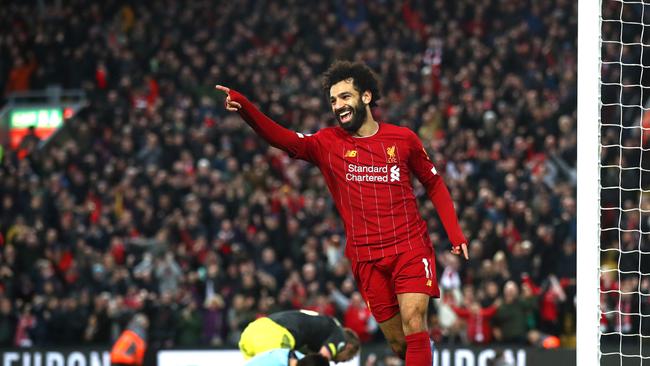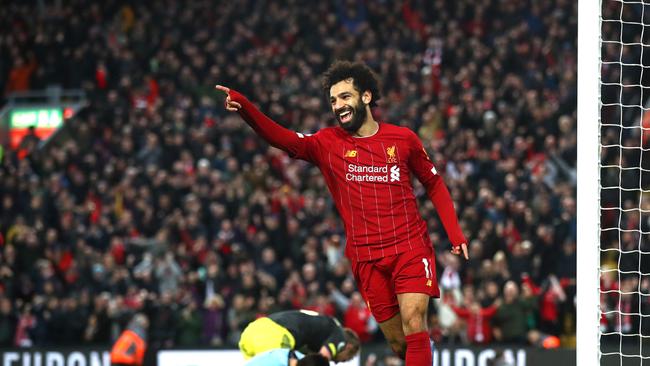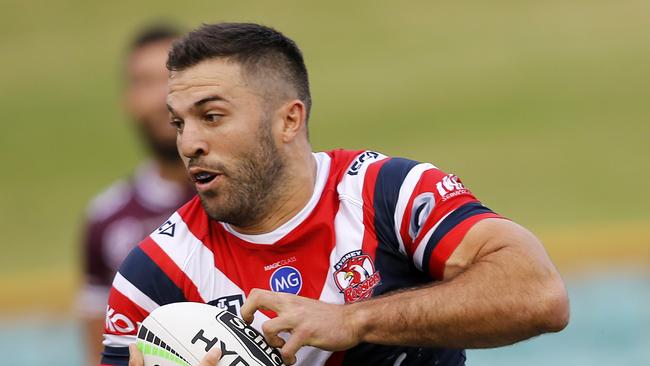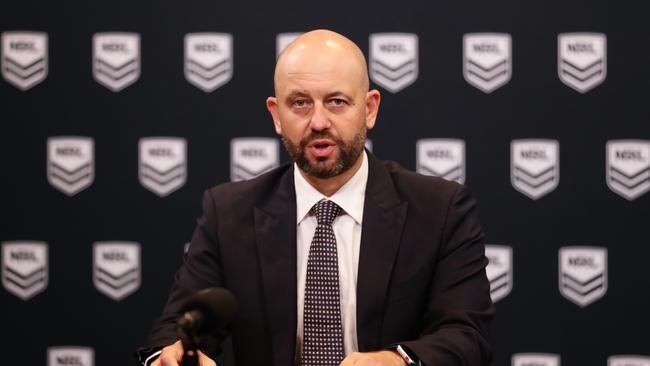NRL clubs want to emulate English Premier League model of administration
Disgruntled NRL clubs want the game to implement an administrative style that takes after the English Premier League which would grant them greater decision making powers.

Teams
Don't miss out on the headlines from Teams. Followed categories will be added to My News.
- Feeling the heat: Who’s next on NRL chopping block
- ‘Brutal’: V’landys in stunning rugby league admission
Greater decision-making powers, decentralisation and transparency are just some of the key features of the English Premier League model that NRL clubs want to explore post the coronavirus crisis.
A 14-page document prepared by the Premier League, one of the richest sporting brands in the world, which breaks down its operations and role as a governing body is being shared among high level NRL executives, turning clubs into advocates for the model.
The COVID-19 pandemic laid bare the NRL’s financial state, ultimately costing Todd Greenberg his job as CEO and forcing a major restructure of its business.
One CEO told The Daily Telegraph taking a similar approach to the EPL – where the 20 clubs are shareholders and the final decision-makers – should be considered as a way to help mend the breakdown of the relationship between clubs and the NRL under previous administrations.
Relive classic NRL matches from the 60s to today on KAYO SPORTS. New to Kayo? Get your 14-day free trial & start streaming instantly >

“Certainly among the clubs they feel ‘why can’t we have a similar approach’ on certain things. We’re members with little voice at this point and we are not decision makers, there are plenty of examples of where clubs have had little to no say in decisions," he said.
“Look at the way the Premier League consulted with clubs because they are shareholders, they were able to achieve a lot through stakeholder and consensus management between everyone. That was one element we all agreed is a better way of going.
"It's not head office telling clubs this is what we think you should do."
The document obtained by The Daily Telegraph also shows just how the Premier League distributes its centralised revenue among the 20 clubs.
Centralised revenue for season 2018/2019 was about 3 billion pounds, made up of broadcast funds and centralised commercial revenue like naming rights and sponsorship.
Around 83 per cent of all central revenue was distributed to clubs representing almost 2.5 billion pounds in payments. NRL clubs receive around 43 per cent of equivalent revenue - a total of $228 million in 2019.

“We’ve been labelled greedy particularly by some people at the NRL as being greedy, accepting 43 per cent of the game's revenue and other leagues around the world are getting in excess of 80 per cent. We aren’t saying we should mirror the Premier League but somewhere between 43-83 is a bit more reasonable,” he said.
Despite the Premier League being one the most successful sporting competitions in the world, remarkably it only spends 2 per cent of revenue on expenses.
The NRL booked almost $183 million in expenses on $528 million in revenue in 2019, representing 35 per cent of revenue.
“They have a laser focus on costs and keeping them down to a minimum across the business and they can do that because they have the principles and discipline of a structure," an interstate CEO said.
The remaining 15 per cent of the Premier League’s centralised revenue goes to lower league clubs and wider football and community development.
The Premier League’s overriding philosophy of supporting clubs and in particular it’s motto “do something to support clubs, every day’ really hit a note with NRL executives, who described their relationship with past administrations as lacking transparency and combative.

“The fundamental remit of its head office is to ensure good corporate governance and to manage the day to day affairs of the League on behalf of the clubs who are the decision makers through their shareholding. The structure instils strong transparency and accountability due to the fact that the clubs require detailed information in order to make informed decisions. From my understanding the Premier League has had a long term amicable relationship with its clubs,” said a Sydney NRL CEO.
One of the reasons the Premier League can keep its staff numbers to around 140 is the decentralisation of certain business areas like digital, events and community. The League helps facilitate those functions but their responsibility lies with the club. It’s another area NRL clubs want to explore.
With ARLC chairman Peter V’landys now at the helm alongside acting CEO Andrew Abdo clubs are more optimistic about the future.
“I am sure that they have their issues from time to time and that there are quirks and flaws in the system, but it is globally recognised as an incredibly successful model. Through Peter [V’landys], we are seeing that interaction starting to occur with club’s and an acknowledgment that we are shareholders in the game. This is really good progress,” he said.
Originally published as NRL clubs want to emulate English Premier League model of administration
